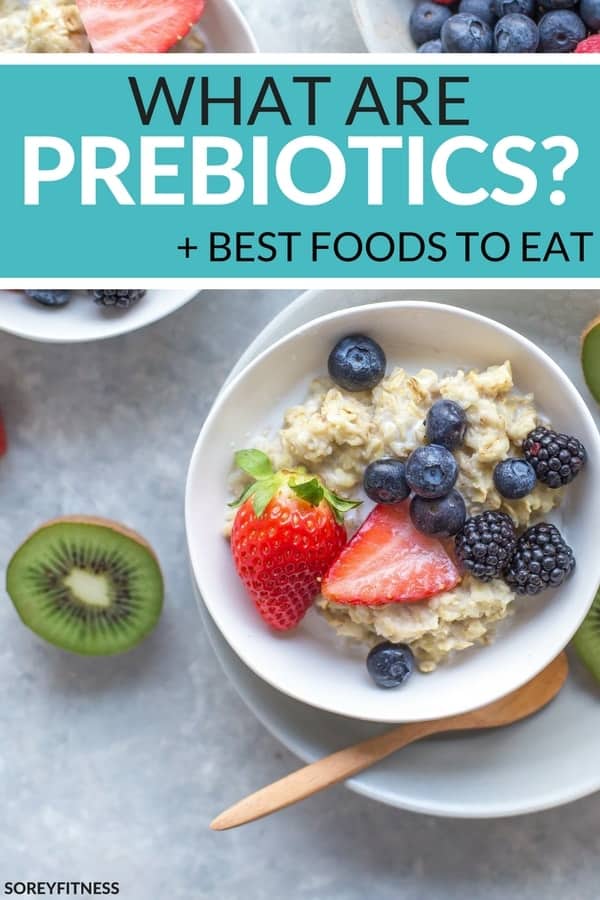What are Prebiotics? Benefits & List of Prebiotic Foods
This post may contain affiliate links. All opinions shared are my own. As an Amazon Associate I earn from qualifying purchases. Click to view our full disclosure.
All content is created by humans – not AI.
Last year a family member had some major gut health issues. Her struggle made us dig into prebiotics and probiotics. While we aren’t doctors, we hope to shed some light on what prebiotics are and share some of the natural ways to consume them in prebiotic foods!
Consider us your geeky health friend sitting across from you at a local cafe sharing what we know. We can be fun & helpful, but we’re not giving medical advice.

First off:
You’ve probably heard about probiotics, but prebiotics are just as important. Probiotics are healthy microflora in your belly, and prebiotics are what help them thrive.
What are Prebiotics?
Prebiotics are these non-digestible fiber compounds that help probiotics in our colon. Without them, we may gain weight, have higher levels of inflammation or suffer with poor digestion (source).
Prebiotics are found naturally in a lot of foods. Most of us get them through a healthy diet. So if you see an Activia commercial – just know, it’s not the only way to get things going!
Prebiotic Benefits
In our research and past studies, we found prebiotics have a ton of benefits!
According to our sources, prebiotic benefits include:
- lower risk for cardiovascular disease
- better cholesterol levels
- improved gut health
- stress support
- improved digestion (helped both diarrhea & constipation)
- better hormonal balance
- better immune system support
- decreased risk in obesity
- lower inflammation
- prevent or reduce colds or flus
- ease eczema
List of Prebiotic Foods
The coolest things about all this? You are probably eating or enjoy prebiotic foods already!
Prebiotic Foods include:
- Greenish Bananas
- Apples
- Berries
- Citrus Fruits
- Onions
- Raw Garlic (great in salads and hummus!)
- Raw Leeks
- Fermented or Raw Asparagus
- Artichokes
- Yams
- Whole-grains like oats (no enriched flour)
Those are the common ones.
However, there are some more unusual prebiotic foods we found as well.
- Flaxseed (Great in oatmeal!)
- Wheat Germ (Also great in oatmeal!)
- chicory root – raw (Often used in sauerkraut)
- dandelion greens – raw (Top a salad with them!)
- jicama – raw
Is raw apple cider vinegar a prebiotic?
It seems like raw apple cider is a natural cure-all from anything from gout to weight gain. But it’s not actually all that great.
Self did a great article on its “many benefits” if you’re interested in apple cider vinegar specifically.
In regards to raw apple cider vinegar being a prebiotic, it’s kinda 50/50. It contains pectin, and pectin is a prebiotic (source).
Prebiotics vs Probiotics
We’ve kind of hit on prebiotics vs probiotics already, but we want to make sure it’s clear.
Probiotics are the healthy bacteria in our colon, and prebiotics act as their fertilizer. They help probiotics grow and keep the colon healthy.
Some probiotic foods would be fermented foods like kefir, yogurt, and sauerkraut.
You need both of these little guys to keep your gut healthy and happy.
You May Hear the Term “Prebiotic Fiber”
In short – prebiotics are 1 type of fiber. This type of non-digestible fiber can also be called oligosaccharides.
Prebiotic fiber isn’t broken down before it hits your colon which is where it does it magic to feed your probiotics (good bacteria).
Favorite Prebiotic Supplements
Honestly, when we started researching prebiotics and probiotics, we really thought we’d end the post with a prebiotic supplement we loved.
With that said, if you’re eating a healthy diet – you probably don’t need one.
Some of these supplements, or even brands that advertise being “high in fiber” can contain other harmful ingredients.
For example, Fiber One bars contain artificially added fiber and additives which can make your digestion worse!
Always talk to your doctor or pharmacist about adding a prebiotic (or really any supplement) to your diet to see if it can help or harm you as well.




